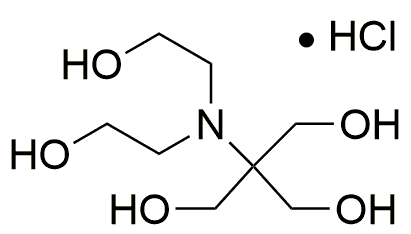Bis-tris hydrochloride is widely utilized in research focused on:
- Biological Buffers: It serves as an effective buffering agent in biological and biochemical experiments, maintaining pH stability in various assays, which is crucial for enzyme activity and cell culture.
- Protein Purification: This compound is often used in protein purification processes, particularly in chromatography, where it helps to stabilize proteins and improve yield during purification.
- Electrophoresis: In molecular biology, it is commonly used in electrophoresis techniques, providing a consistent pH environment that enhances the resolution of nucleic acids and proteins during separation.
- Pharmaceutical Formulations: Bis-tris hydrochloride is utilized in the formulation of various pharmaceuticals, ensuring the stability and efficacy of active ingredients in drug development.
- Research and Development: It plays a significant role in R&D labs for developing new biochemical assays and testing protocols, especially in studies involving enzymes and metabolic pathways.
General Information
Properties
Safety and Regulations
Applications
Bis-tris hydrochloride is widely utilized in research focused on:
- Biological Buffers: It serves as an effective buffering agent in biological and biochemical experiments, maintaining pH stability in various assays, which is crucial for enzyme activity and cell culture.
- Protein Purification: This compound is often used in protein purification processes, particularly in chromatography, where it helps to stabilize proteins and improve yield during purification.
- Electrophoresis: In molecular biology, it is commonly used in electrophoresis techniques, providing a consistent pH environment that enhances the resolution of nucleic acids and proteins during separation.
- Pharmaceutical Formulations: Bis-tris hydrochloride is utilized in the formulation of various pharmaceuticals, ensuring the stability and efficacy of active ingredients in drug development.
- Research and Development: It plays a significant role in R&D labs for developing new biochemical assays and testing protocols, especially in studies involving enzymes and metabolic pathways.
Documents
Safety Data Sheets (SDS)
The SDS provides comprehensive safety information on handling, storage, and disposal of the product.
Product Specification (PS)
The PS provides a comprehensive breakdown of the product’s properties, including chemical composition, physical state, purity, and storage requirements. It also details acceptable quality ranges and the product's intended applications.
Certificates of Analysis (COA)
Search for Certificates of Analysis (COA) by entering the products Lot Number. Lot and Batch Numbers can be found on a product’s label following the words ‘Lot’ or ‘Batch’.
Numéro de catalogue
Numéro de lot/série
Certificates Of Origin (COO)
This COO confirms the country where the product was manufactured, and also details the materials and components used in it and whether it is derived from natural, synthetic, or other specific sources. This certificate may be required for customs, trade, and regulatory compliance.
Numéro de catalogue
Numéro de lot/série
Safety Data Sheets (SDS)
The SDS provides comprehensive safety information on handling, storage, and disposal of the product.
DownloadProduct Specification (PS)
The PS provides a comprehensive breakdown of the product’s properties, including chemical composition, physical state, purity, and storage requirements. It also details acceptable quality ranges and the product's intended applications.
DownloadCertificates of Analysis (COA)
Search for Certificates of Analysis (COA) by entering the products Lot Number. Lot and Batch Numbers can be found on a product’s label following the words ‘Lot’ or ‘Batch’.
Numéro de catalogue
Numéro de lot/série
Certificates Of Origin (COO)
This COO confirms the country where the product was manufactured, and also details the materials and components used in it and whether it is derived from natural, synthetic, or other specific sources. This certificate may be required for customs, trade, and regulatory compliance.


